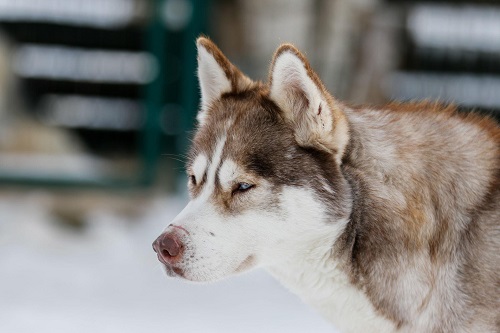Huskies, those captivating and energetic canine companions, often leave their owners wondering about their unique behavior traits. Among these traits, one particular characteristic stands out: stubbornness.
While huskies possess a striking appearance and a friendly disposition, their stubborn tendencies can sometimes be a source of frustration for pet owners. We will explore the reasons behind their stubborn behavior and explore effective strategies for dealing with it.
Understanding the Husky Temperament
To comprehend why huskies can be so stubborn, it’s essential to understand their temperament. Huskies are known for their intelligence, independence, and strong-willed nature.
Bred as working dogs in harsh Arctic conditions, their history contributes to self-reliance and decision-making. This independent streak can translate into stubbornness when following commands or adhering to routines.
Factors Behind Husky Stubbornness
- The Role of Genetics: Genetic factors play a significant role in a husky’s temperament. Their ancestry as sled dogs required them to make quick decisions in challenging environments, resulting in a level of independence. This genetic predisposition can influence their behavior today.
- Huskies and Independence: Huskies have an innate need for independence, which can sometimes clash with the expectations of a household environment. This desire for autonomy can lead to them resisting commands or choosing their own path.
Why Are Huskies So Stubborn?
Huskies’ stubbornness can be attributed to a combination of their genetic makeup and their natural inclination for independence.
These factors, rooted in their history as working dogs, contribute to their unique behavior. This stubbornness often emerges during training sessions and daily interactions, posing challenges for owners.
Training Challenges and Tips
Training a stubborn husky requires patience and a tailored approach. Traditional training methods might not yield the best results, as huskies tend to resist coercion.
Instead, opt for positive reinforcement techniques. Reward desired behaviors with treats, praise, and play to motivate your husky.
Building a Strong Bond
Cultivating a strong bond with your husky can positively impact their behavior. Spend quality time together through activities such as walks, playtime, and grooming.
A closer connection can lead to better communication and cooperation.
Socialization Matters
Early socialization reduces stubbornness. Exposing your husky to various environments, people, and animals from a young age can help them develop better adaptability and reduce their resistance to new experiences.
Mental Stimulation and Enrichment
Huskies are intelligent and need mental stimulation to prevent boredom-induced stubbornness. Provide puzzle toys, engage in interactive games, and incorporate obedience exercises into daily routines. A mentally engaged husky is more likely to be cooperative.
The Power of Positive Reinforcement
Positive reinforcement is a cornerstone of training stubborn huskies. Instead of punishing undesirable behavior, focus on rewarding good behavior.
This approach encourages a more positive response and helps build trust between you and your husky.
Dealing with Specific Behavioral Issues
Addressing specific behavioral issues requires targeted strategies. For instance, if your husky pulls during walks, use a harness that discourages pulling.
For excessive barking, teach the “quiet” command and reward silence. Tailoring solutions to specific problems can make a significant difference.

Huskies vs. Other Dog Breeds
It’s important to recognize that every dog breed has its unique traits. While huskies may exhibit stubbornness, other breeds might showcase different challenges.
Understanding breed-specific behaviors helps set realistic expectations and enables effective training.
Common Misconceptions
Misconceptions about huskies can hinder effective training. One common misconception is that huskies are inherently disobedient. In reality, their independence can be channeled into positive behaviors with the right approach.
FAQs
While all huskies have a certain level of independence, with the right training methods and consistency, most can learn to follow commands and reduce stubborn behaviors.
Yes, early socialization is crucial. Exposing your husky to various situations helps them develop confidence and adaptability, minimizing stubbornness in unfamiliar scenarios.
Stubbornness isn’t strictly tied to gender. Each husky’s personality varies, and training techniques should be tailored to the individual dog rather than generalized by gender.
Punishment can lead to fear and anxiety, worsening stubborn behaviors. Positive reinforcement and patient training methods are more effective and humane approaches.
Start training as early as possible. Puppies have a critical learning period, but adult huskies can also be trained with patience and consistency.
Conclusion
As a result, the stubbornness of huskies is a result of their genetic makeup, their history as working dogs, and their independent nature. Rather than viewing their behavior as a hindrance, embracing their uniqueness can lead to more harmonious interactions.
By employing positive reinforcement techniques, building strong bonds, and providing adequate mental stimulation, husky owners can navigate the challenges of stubbornness and enjoy fulfilling relationships with their spirited companions.
